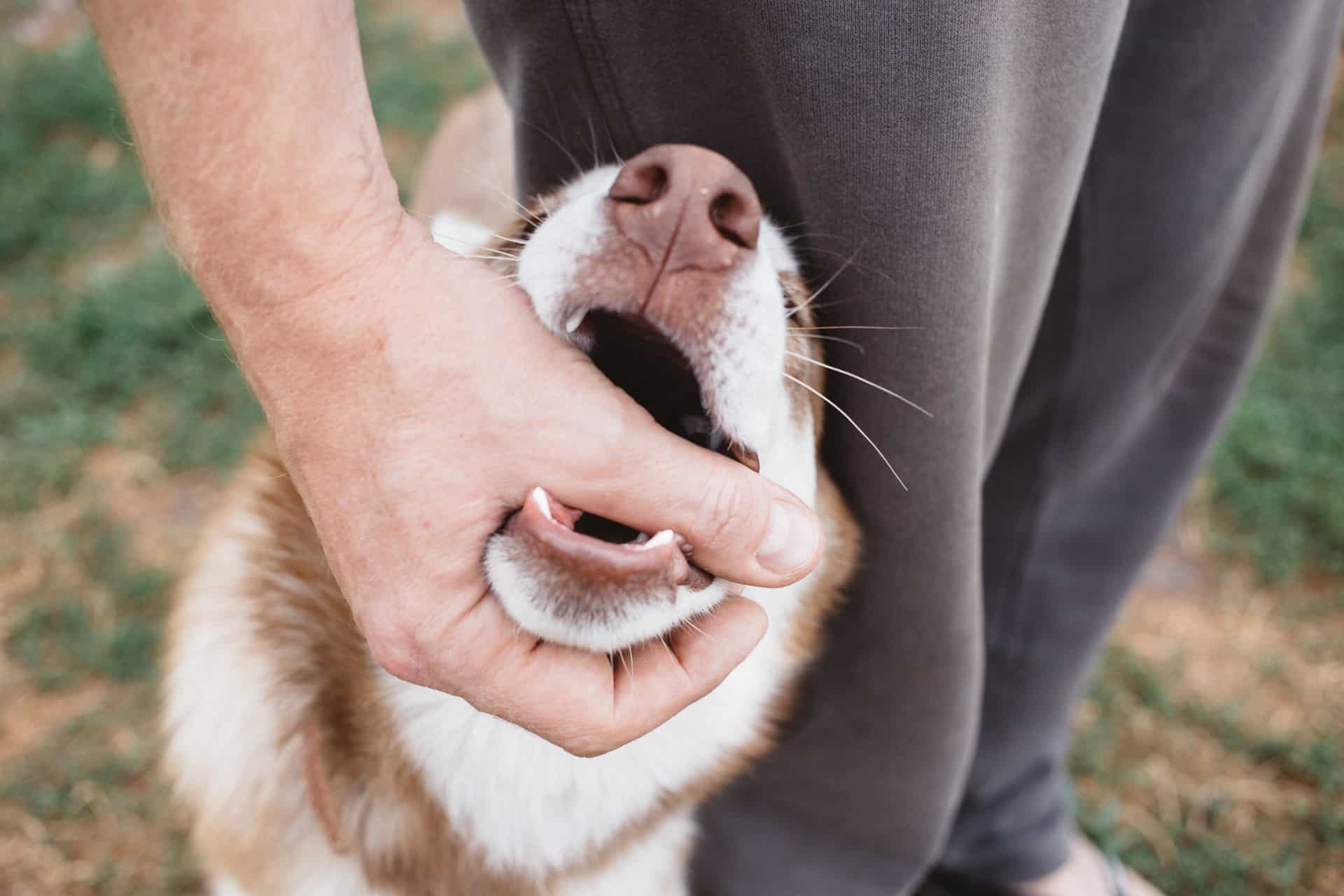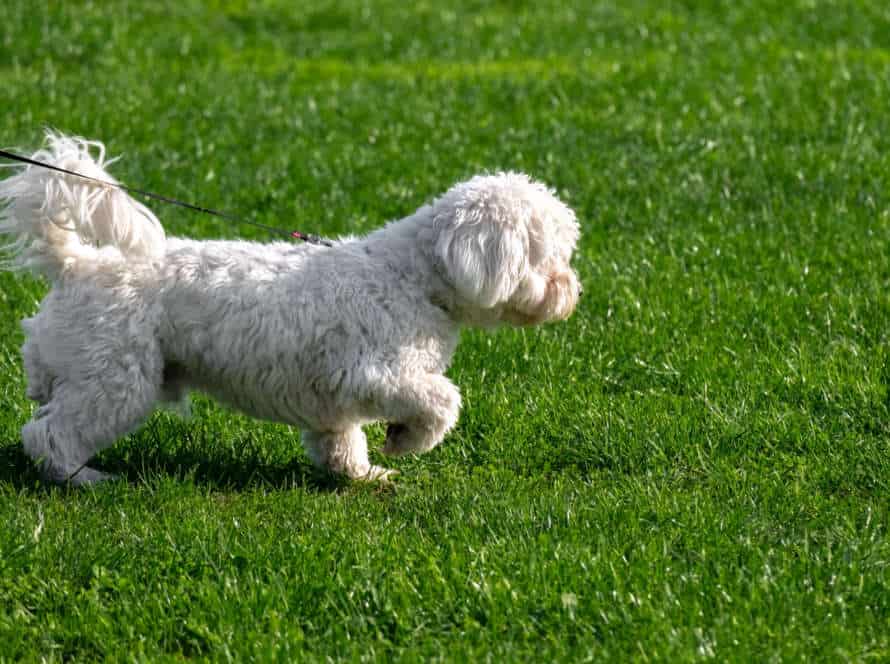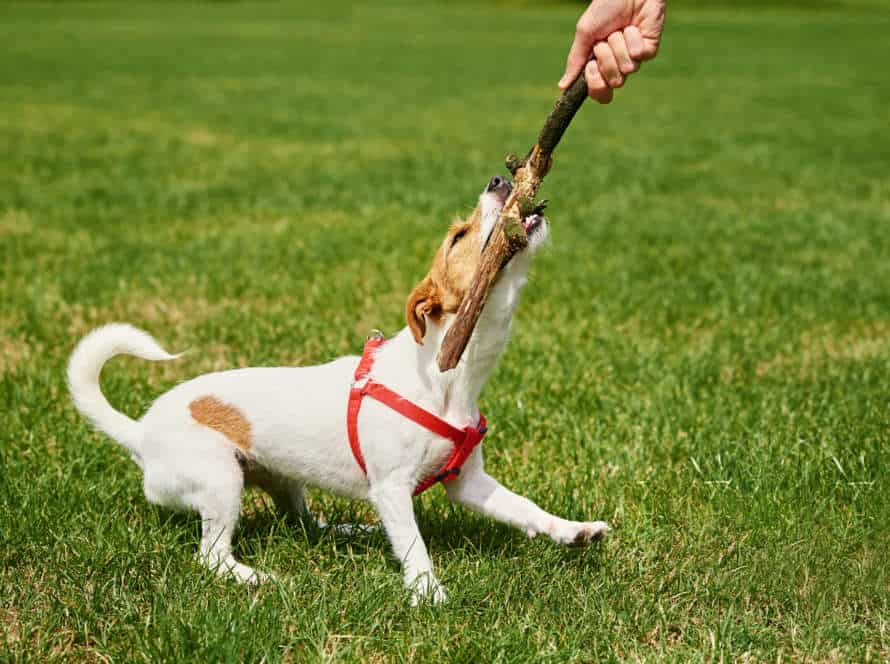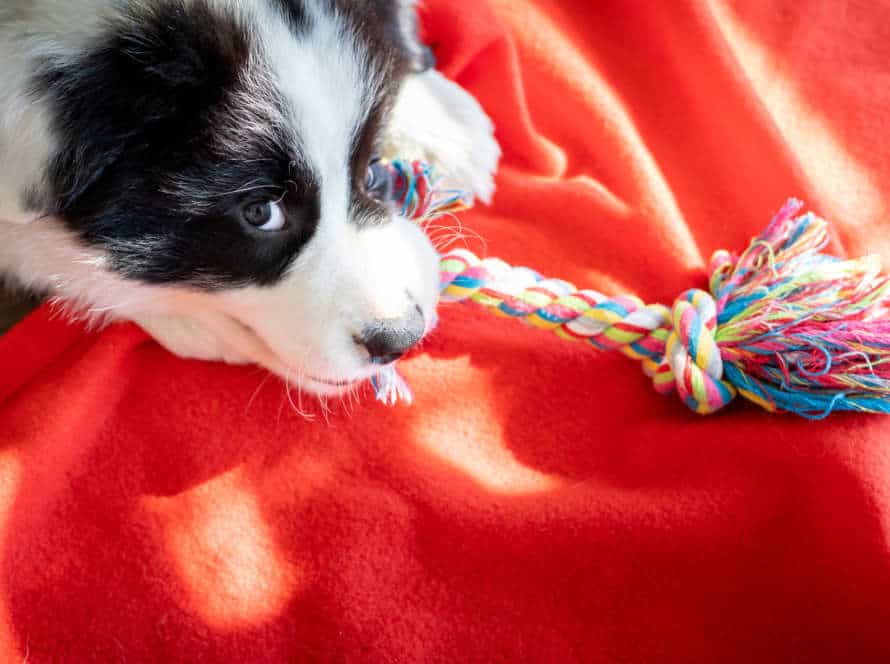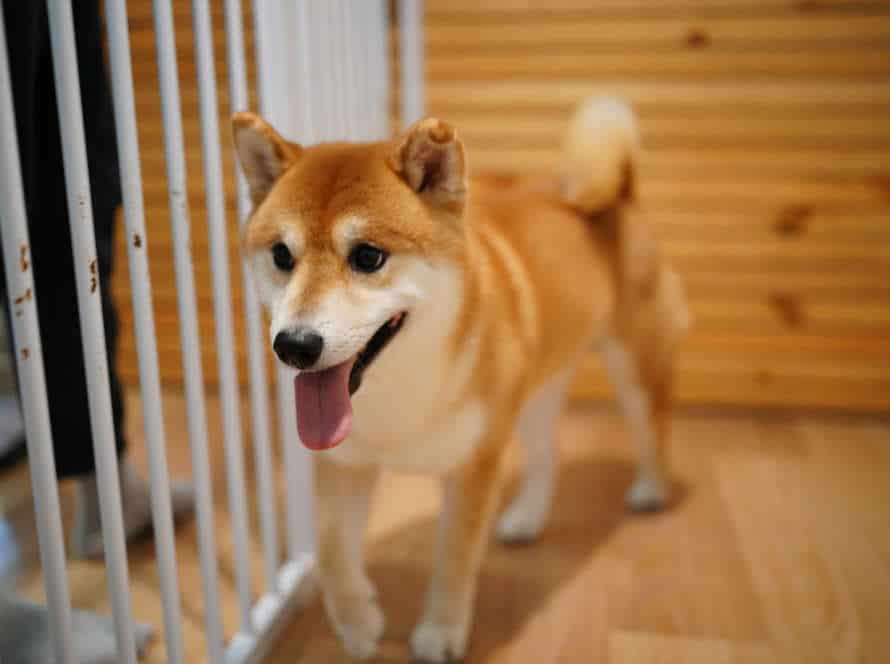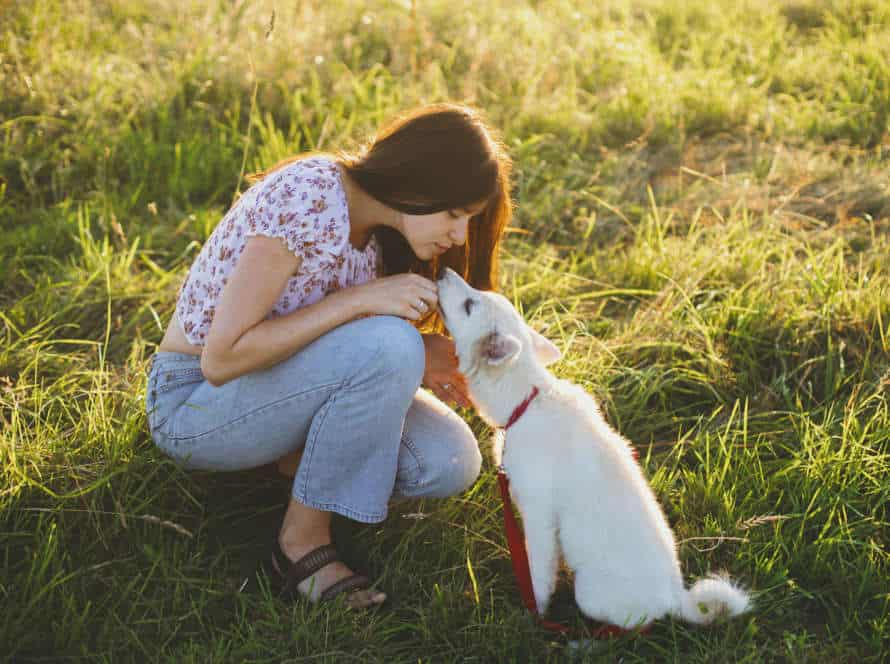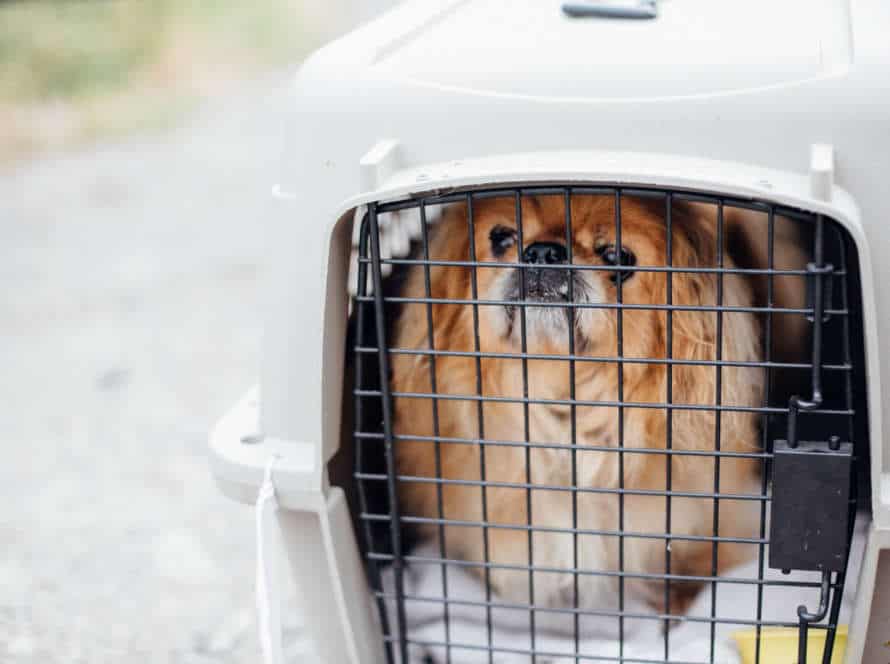How to Prevent Your Puppy from Biting During Playtime
Puppies are renowned for their playful nature, but that often includes biting and nipping. This can cause severe harm. Here are some ways to stop your puppy nipping during play:
- Set Boundaries: Establishing limits early on is vital. Let your puppy know what’s ok in playtime. As soon as they bite, say ‘NO’ loud and give them a toy to focus on.
- Reward Good Behavior: When your puppy plays without biting, reward them with treats or praise.
- Socialize: Introducing your puppy to other dogs and people from an early age can teach them biting is not ok.
- End Playtime: If your pup is still biting and too excited, take a break and end the playtime.
By following these tips, you can help your puppy understand that biting is not ok during playtime. This will help build a healthy relationship with your pet.
Understanding Puppy Behavior
Grasping doggy doings is essential for stopping them from biting during play. Puppies have sharp chompers and can get hyped up when playing, so it’s imperative to recognize their communication signs and adjust your strategy accordingly. Let’s investigate some of the regular puppy behaviors and how to stop them from biting during playtime.
Why do puppies bite?
Puppies explore, teethe, and play by naturally nipping and biting. This is normal, but it can be a problem if not managed. Here are some tips to stop puppy biting:
- Redirect: If your puppy bites during playtime, turn their attention to a chew toy or another game.
- Train: Use positive reinforcement to train your puppy to stop biting. Reward them for good behavior.
- Socialize: Help your puppy meet other dogs and people. This will teach them proper play behavior and reduce biting.
- Pay Attention: Watch your puppy’s body language and behavior during playtime. If they act aggressively or bite too hard, end the session and let them cool down.
By doing these things, you can help your puppy play nicely and avoid biting.
When do puppies start teething?
Puppies start teething around 3-4 months. Adult teeth come in, and this can make them irritable. They may chew on anything to help the discomfort.
To prevent biting during playtime:
- Provide lots of chew toys.
- Redirect attention to toys when they nibble clothes or furniture.
- Take breaks and offer water.
- Avoid rough play with hands.
- Don’t allow any biting, not even playful nips. Eventually, they’ll learn it’s not okay.
How do puppies communicate with their mouths?
Puppies communicate with their mouths. This can include playfulness, curiosity and aggression. To stop biting during playtime, it’s important to understand these behaviors.
- Mouthing: Puppies explore and learn with their mouths. If it becomes too rough, offer them appropriate toys or end playtime.
- Play-biting: Puppies use their mouths to play. If they bite too hard, say “ouch” and end playtime. Reward gentle behavior.
- Aggressive biting: This is serious and needs a professional. Never punish them. Get help from a qualified trainer.
By understanding puppy mouth behavior, we can prevent biting and promote a happy relationship.
Training Techniques to Prevent Puppy Biting
Puppy biting is typical when playing. Yet, it’s vital to teach your pup to be gentle and not bite too strongly. Luckily, there are lots of training methods that can help stop your puppy from biting while playing. We’ll give you hints and techniques on how to educate your puppy to be gentle when they play.
Positive Reinforcement Training
Positive reinforcement training is a great way to stop puppy biting during playtime. Try these steps:
- Teach your pup basic commands like “sit,” “stay,” and “come” with rewards and clicker training.
- When they nip or chew on clothes, give them a toy instead.
- Don’t play rough games like tug-of-war or wrestling as it can induce biting.
- Reward good behavior like polite greetings and gentle play.
- Stay consistent and patient – and soon your pup will learn to play nicely!
Using treats and praise
Treats and praise can help stop puppy biting during playtime. Here’s what to do:
- Give a treat and lots of praise whenever puppy plays without nipping or biting.
- When pup does bite or nip, say “no” firmly.
- Stop play and wait for pup to calm down.
- Resume play, and if pup still doesn’t bite or nip, give another treat and praise again.
With consistent practice, pup will learn that playing without biting is more rewarding than biting. This will help stop biting behavior during play.
Clicker training
Clicker training is a successful way to stop puppy biting during playtime. It works by linking a special sound with good behavior. To do this:
- Obtain a clicker & treats for your puppy.
- When your pup is playing nicely, like chewing on a toy instead of your hand, click the clicker & offer a treat straight away.
- Do this repeatedly until your puppy links the click sound to good behavior.
- Whenever your puppy starts to bite you during playtime, make a loud & firm “ouch” sound to show that biting is not ok.
- Change your pup’s attention to a toy & reward nice behavior with the clicker & treats.
With consistent practice, your pup will learn that biting has bad outcomes & gentle play brings good rewards.
Redirecting Biting to Appropriate Toys
Redirecting your pup’s biting to suitable toys during playtime is a must-do training technique for avoiding destructive behavior. Plus, it encourages a great relationship between you and your dog! Here are some methods to try:
- Replace your hand or clothing with a chew toy the moment your puppy starts to bite.
- Make the toy more attractive by playing tug-of-war or using treats.
- Use a firm and clear command like “no biting” or “leave it”, to show your puppy that biting is not okay.
- Be consistent in redirecting their behavior, even when you’re not playing with them.
- Finally, reward your pup with verbal praise, treats, or extra playtime when they chew on the right toys. With time, they will learn to link positive feedback with good behavior, instead of biting.
Choosing the right chew toys
Picking the right chew toys is essential to stop your puppy from biting when they play. Here are tips to remember:
- Size: Make sure the chew toy fits your puppy’s breed and age to stop choking.
- Durability: Get a sturdy chew toy that will last a long time.
- Texture: Get a chew toy with different textures.
- Avoid bad materials: Don’t get chew toys made of toxins like plastics or fake materials.
- Variety: Give your pup different chew toys to stop boredom and help them learn healthy habits.
Providing the appropriate chew toys can also stop your pup from biting things like shoes or furniture, and turn them back to the appropriate toys.
Teaching your puppy to “drop it”
“Drop it” is an essential command for every puppy owner. To stop aggressive behavior and curbing biting during playtime, here are some effective training ideas:
- Give treats or toys to capture your pup’s attention.
- Show them something more attractive when they have something in their mouth.
- Praise and treat them when they drop the original object.
- Be consistent in your training and reward them every time.
- Practice the command during every training session and playtime.
- Eventually, the command will become second nature and they will be less likely to bite or act aggressively during playtime. Pro tip: Positive reinforcement like treats and praise will help speed up the training process.
Encouraging Calm Play
To train your pup to avoid biting during play, encouraging calm is key. Here’s how:
- Set limits – make clear guidelines and stay consistent.
- Praise good behavior – give rewards for gentle playing and calm interactions with family.
- Supply toys – offer your pup chew toys and interactive items to move their biting to the right things.
- Train commands – teach pup “Sit” and “Stay” for self-control and obedience.
- Stop play when needed – if pup gets too excited or aggressive, end play and redirect them.
Training a pup takes time and patience. With effort and positive reinforcement, you can teach ’em to play calmly and stop biting during playtime.
Recognizing when your puppy is overstimulated
Spotting when your pup is overstimulated is key to preventing puppy biting during playtime. Here are some signals to look out for:
- Whining, barking or growling.
- Heavy panting and drooling.
- Chewing too much.
- Not responding to commands.
- Excessive pacing, running or jumping.
When you spot these signs, pause the playtime. Give your pup a chew toy or take a break altogether. Eventually, they’ll know their limits and boundaries, and puppy biting will be less likely. It’s essential to be consistent with training and avoid rough play – it can lead to overstimulation and bad behavior.
Teaching your puppy to calm down
Teaching your pup to relax is a must-do in their learning. Here’s how:
- Practice quick training with your pup.
- Use a treat or toy to bring your pup into chill mode.
- Applaud and reward when they stay relaxed.
- Teach your pup verbal or gestural cues to indicate chill-time.
- No physical force or punishment when calming them.
- Be consistent and wait patiently.
Eventually, your pup will associate calmness with rewards. Pro tip: Monitor your pup during play and keep an eye on their behavior, to avoid any chomping.
Consistency and Routine in Biting Prevention
Consistency and routine – these are the keys to stopping your pup from biting during playtime. Set rules and expectations for both you and your pup. Training your pup properly will have a huge influence on reducing and eventually ending the biting. Spend quality time teaching them!
Setting Boundaries and Staying Consistent
Establishing boundaries and being consistent is key for avoiding puppy biting during play. A routine will help shape your pup’s behavior, showing them when it’s good to bite and when it’s not.
Here are some tips:
- Set specific playtimes and stick to them.
- Give toys or chew items during playtime to prevent biting.
- Avoid rough play like wrestling or tug-of-war, which can cause biting.
- If puppy bites during play, stop and walk away.
- Praise and reward pup when they don’t bite.
With steady training and a clear plan, you can help pup have healthy playtime habits and stop biting.
Maintaining a Routine for Playtime
Create a routine for playtime with your pup! It’s a great way to stop them from biting. Puppies love playtime and it’s the perfect way for them to bond and socialize with you. But, it’s natural for them to bite, which is their way of exploring and learning.
Here are some tips to help:
- Set aside specific times for play every day and stick to it.
- Use toys during play, not hands or feet.
- If they start biting, stop playing and firmly say ‘no’ or ‘ouch’.
- Redirect their attention to a toy or treat.
With consistency and patience, they’ll learn that biting is not okay.
Involving Family and Friends in the Training Process
Involve your family and friends in teaching your pup to not bite.
It’s important to be consistent in training to ensure that your pup understands the rules.
Show them how you’re training your pup and ask them to do the same. This will help your pup understand the rules and build a stronger bond.
Pro Tip: Consistency is vital in teaching your pup. Everyone in your home must use the same techniques and routines to avoid confusing your pet.
Give advice and guidance if needed to ensure that everyone is on the same page.
Common Mistakes to Avoid
Having a puppy is amazing! Their playtime is essential for a healthy relationship. But, if it’s done wrong, it can lead to biting. Here are the mistakes owners make during playtime and how to prevent it:
Using Punishment as a Training Technique
Punishment can be a bad way to train your puppy not to bite during playtime. It can lead to fear and aggression instead of obedience. To avoid making mistakes, here’s what you should not do:
- No physical punishment like hitting or smacking. This can hurt them emotionally and physically.
- Yelling or screaming is also a no-no. This can be intimidating and increase fear.
- Don’t use shock or prong collars either. These can cause injury and psychological harm, leading to trust issues and aggression.
Instead, use toys, treats, and positive reinforcement. Clicker training is a good option. It teaches them biting is not desirable and rewards good behavior. With patience and consistent training, you’ll have a happy, well-behaved pup.
Allowing Rough Play and Tug-of-War
Don’t let your pup play roughly or do tug-of-war, as it could cause biting and aggressive behavior. Here are some tips to stop your pup from biting during playtime:
- Don’t use your hands as toys.
- Give your pup chew toys and encourage them to play with them.
- Use positive reinforcement for good behavior.
- Supervise playtime and don’t allow rough play.
- If your pup is aggressive or bites, get professional help.
Pro Tip: To stop biting during playtime, be consistent with training and provide toys.
Reacting to Biting with Fear or Aggression
Reacting with fear or aggression to a pup’s biting during play is a common mistake. Here are a few tips to prevent it:
- Establish boundaries – Say “No” firmly but calmly when they try to nip.
- Provide toys – Give them safe toys to play with instead.
- Reinforce positive behavior – Praise and reward when they don’t bite.
- Be consistent – Training takes patience, firmness and kindness.
When to Seek Professional Help
Puppy biting is something that needs to be managed. Training and discipline can help, but if it continues, there could be a bigger issue. If this is the case, get help from a pro! A dog trainer or vet behaviorist can help.
How to choose the right one? Here’s the info you need.
Not Seeing Progress in Biting Prevention
If progress in preventing puppy biting during playtime is absent, maybe it’s time to look for professional help. Here are signs that suggest seeking help:
- Biting is getting worse or more forceful.
- Biting people, uninvited or during normal activities.
- Biting causes injury or fear in people/pets.
Remember, biting is a natural behavior in puppies. But it needs to be corrected early. Here are tips for preventing biting during playtime:
- Give puppy lots of chewable toys to distract from hands/feet.
- Use positive reinforcement for appropriate behaviors, e.g. licking instead of biting.
- Always correct wrong biting with a ‘no’ or ‘ouch’.
- Stay calm/firm – no physical punishment or aggression.
- If no signs of progress, don’t wait – seek help from a trainer/behaviorist specializing in puppy biting.
Extra Tip – Training sessions and socialization playdates will teach pup proper cues/behaviors.
Aggression and Fear-Based Behaviors
Aggression and fear-based behaviors in puppies can be challenging. But, the right techniques can help prevent or minimize them. Here’s how:
- Use toys – Give your pup chew toys or tug ropes to redirect their attention away from biting.
- Positive reinforcement – Reward your puppy for positive behaviors, like licking or nuzzling. This will encourage gentle play and discourage biting.
- Consistency – Apply the same rules throughout playtime. Don’t use physical punishment or aggression, as this can worsen the situation.
If your puppy is exhibiting severe aggression or fear-based behavior, seek professional help from a vet or animal behaviorist.
Working with a Certified Dog Trainer or Behaviorist
Is your pup biting during playtime? It may be time to get professional help. A certified dog trainer or behaviorist has the expertise to understand your pup’s needs and give a custom training plan.
When hiring someone, look for certifications from an accredited organization like the Association of Professional Dog Trainers or the Certification Council for Professional Dog Trainers.
Be honest about your pup’s behavior, history and any prior training. Follow your trainer or behaviorist’s advice, including any at-home exercises or daily routine changes.
Working with a professional takes time and effort, but it can result in a well-behaved, happy pup!
Frequently Asked Questions
Q: Why does my puppy bite during playtime?
A: Puppies explore the world with their mouths and biting is a natural part of play. However, it’s important to teach them what’s appropriate and what’s not.
Q: How can I prevent my puppy from biting me or others?
A: One effective way is to redirect their attention with toys or treats whenever they start to nibble. You can also teach them commands like “gentle” or “leave it.”
Q: Is it okay to use physical punishment to discourage biting?
A: No. Physical punishment can make the behavior worse and damage the trust between the puppy and owner. Positive reinforcement training techniques are more effective and humane.
Q: How can I encourage my puppy to play gently?
A: It’s important to always supervise playtime and stop any rough play immediately. Reward calm behavior and redirect them to toys or activities that encourage gentle play.
Q: When should I seek professional help for my puppy’s biting behavior?
A: If your puppy continues to bite despite your efforts to discourage the behavior or if the biting is aggressive or fearful, it’s important to seek the help of a professional dog trainer or behaviorist.

